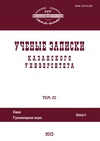Правовое воздействие на демографические процессы в древнейших законодательствах (на примере римского брачно-семейного права)
The Legal Impact on Demographic Processes in Ancient Legislations (Using the Example of Roman Marriage and Family Law)
Author(s): Yu.M. LukinSubject(s): History of Law, Demography and human biology
Published by: Казанский (Приволжский) федеральный университет
Keywords: legal regulation of birth giving; Ancient India; Ancient Babylon; Ancient China; Ancient Rome; Lex Julia et Papia Poppaea;
Summary/Abstract: The paper deals with the regulation of demographic processes in the legal systems of Ancient Babylon, India, and China. Special emphasis has been placed on the legislation of Ancient Rome. Special legislative acts of the Roman state issued for regulation of the demographic situation in the Roman society have been analyzed. It has been revealed that the increase and decrease of population of the Roman state was associated with the provisions of Roman laws in the sphere of family relations and birth giving. The legislation of Augustus was a period of initial development of the legislation on family and social legislation. It contained the following regulations: “Law on Adultery” (Lex deadulteriis), “Law on Expenses for Luxury” (Lex sumptuaria), and Lex Julia et Papia Poppaea, all developed in the 18 century BC. It has been concluded that these regulations turned out to be the first vivid example of an attempt to legislatively influence the quantitative and qualitative composition of the population. They were aimed not only at increasing the population size, but also at stimulating the growth of certain social groups whose quantitative enlargement was beneficial for the central Roman authorities.
Journal: Ученые записки Казанского университета. Серия Гуманитарные науки
- Issue Year: 161/2019
- Issue No: 1
- Page Range: 41-51
- Page Count: 11
- Language: Russian

